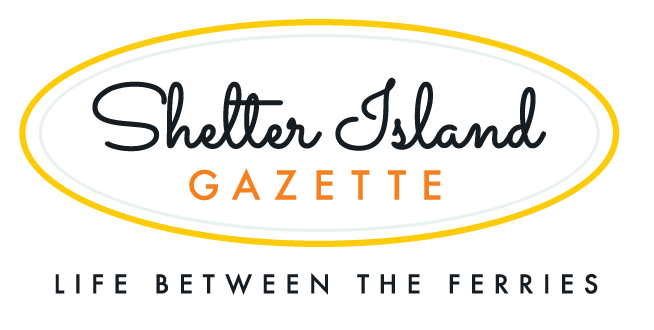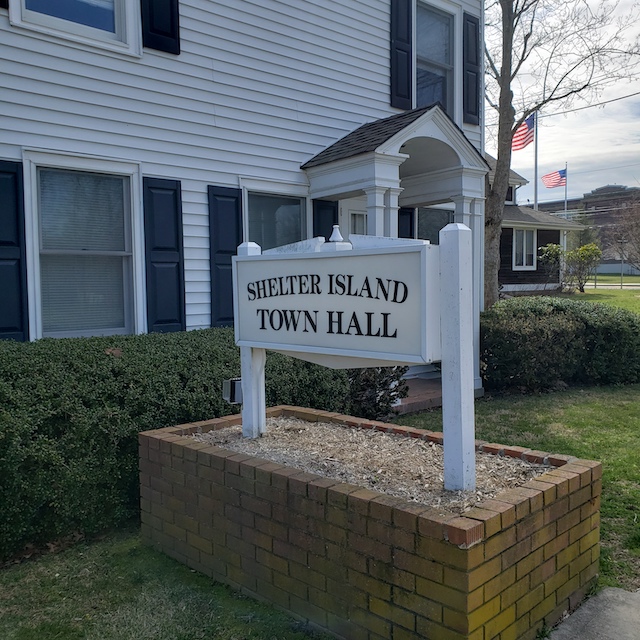The Town’s 2021 independent audit affirmed the impact of pandemic buying on municipal finances, primarily driven by a flood of money into the Community Preservation Fund (CPF).
The Town Board also heard from an environmental consultant that The Ram’s Head Inn dock application needs no further State Environmental Quality Review (SEQR) — a conclusion with some caveats.
Audit affirms pandemic impact
The independent auditor reported at Tuesday’s work session that pandemic buying significantly boosted the Town’s net position. The CPF receives proceeds of a 2 percent transfer tax purchasers pay during most real estate transactions.
COVID-19 triggered a buying spree swelling the Town’s coffers as city dwellers fled urban areas. But the funds can only be used to purchase open space for preservation, with 20 percent going to eligible water quality improvement projects.
Jeff Davoli, audit partner of PKF O’Connor Davies of Happauge, also presented these highlights:
- $270,000 in American Rescue Plan Act funds remain available for eligible COVID-19 expenses
- The Town’s net position increased by $6.3M (mainly due to $5.1 M in Community Preservation Funds) to $22.5M
- Total government revenues were $19.5M ($17.4 in general revenues — partly reflecting a 60 percent increase in CPF as well as larger than expected mortgage tax receipts and $2.1 in program revenues) against $13.2M in expenses
- General Fund revenues were $1.3M higher than initially budgeted (with $450,000 in fund balance)
- Of that amount, $901,000 was state aid primarily due to a $495,000 increase in mortgage tax receipts and $372,000 in aid relating to environmental conservation
- Actual expenditures matched the $10.2M budgeted
- CPF fund balance was $13.9M due to pandemic-buying that brought in $5.1M to the fund (up $2M from the previous year)
- CPF purchases were down in 2021 to $294,000 from $4.5M the previous year when the Town made large purchases of property and conservation easements
- Highway Fund revenues were $300,000 higher than anticipated, while expenses were $401,000 lower than expected
- The consolidated Highway Fund fund balance was $386,000
- The only Capital Projects Fund expenditures were two $197,000 outlays relating to installment agreements for truck purchases
“You look to the health of a government based on the unassigned Fund Balance as it relates to expenditures,” Davoli said. He said anywhere between 10 and 20 percent is considered safe, and the Town’s 2021 unassigned Fund Balance was $2.275M (equal to 22 percent of all expenditures).
GASB and OPEB liabilities
John R. Walsh, the account senior manager, did a quick read-through of the disclaimers typical of municipal audits. One relatively new reporting responsibility area comes under a 2015 statement by the Governmental Accounting Standards Board (GASB).
In Statement #75, GASB required municipalities to report what’s known as OPEB (Other Post-Employment Benefit) liabilities not covered under pension plans.
Municipalities use accounting estimates to calculate and report these liabilities as part of a net position in their government-wide financial statements. GASB does not require municipalities to fund their OPEB liabilities.
If it should choose to do so, it must set up a trust that, under strict GASB rules, solely benefits former employees and is perpetually shielded from creditors. But NYS law doesn’t permit such trusts, nor does the state allow municipal entities to issue bonds to fund these costs. Instead, they’re paid out as they’re incurred.
Deputy Supervisor Amber Brach-Williams, an accountant, noted that the Town is engaged in a bi-annual OPEB review to better anticipate these liabilities.
An earlier GASB rule, Statement #68 in 2014, says municipal entities must estimate their proportionate share of state pension expenses and any deferred inflows/outflows of resources.
“Certain accounting estimates are particularly sensitive because of their significance to the financial statements and because of the possibility that future events affecting them may differ significantly from those expected,” the Town’s audit report said.
The Office of the State Comptroller says the volatility of actuarial data used to estimate such liabilities is due to “changing demographics (people living longer and retiring earlier), changes in the level of benefits offered, and increases in health care costs that are difficult to predict.”
The auditors found no material defects in the Town’s accounting processes and gave a shout-out to Shelby Mundy in the Town accounting office for her assistance. An area of concern is the Town’s capital planning procedures, Walsh said. Brach-Williams noted the Town’s asset management policy is undergoing review.
“I think it just needs some updating,” Walsh said.
SEQR consultant reports on RHI dock
East Hampton-based environmental consultant Billy Hajek presented his conclusions relating to State Environmental Quality Review (SEQR) of The Ram’s Head Inn dock application.
The Inn’s new owner, Aandrea Carter, has applied to replace a Coecles Harbor dock that comes ashore in front of the Inn. Formerly, the adjacent property owner controlled that dock via an easement. But Carter purchased that neighboring property, too. She wants to update the dock to serve the Inn’s guests and restaurant clients arriving by boat.
[Note: this is known as the “Bennett dock” for the sake of clarity in a very complex situation — read earlier coverage in our post “Glimmers of budging from entrenched Ram’s Head Inn dock positions.”]
Meantime, Carter is suing the Town Board over ownership of another Coecles Harbor dock that comes ashore at Town-owned Middle Har-Bay, a paper road that abuts Inn property along the second Ram’s Island causeway.
[Note: aka the “Causeway dock.”]
In that dispute, she’s suing the four Town Council members, Supervisor Gerry Siller and Town Attorney Stephen F. Kiely, in their professional capacities. The four Council members can continue to work on matters relating to her business in their professional capacities. However, she’s also suing Siller and Kiely in their personal capacities. As a result, the two recused themselves from this portion of the Town Board work session.
Brach-Williams, presiding in Siller’s absence, noted that the Town Board was not (yet) re-opening the public hearing on the Bennett dock application. However, she said the board would resume the public hearing at the first opportunity in January.
Under SEQR, municipal entities are responsible for determining whether and to what degree a project subject to discretionary review will have adverse environmental impacts. The municipal entity, known under SEQR as the lead agency, selects among three classifications:
- Type I actions are determined by the state Department of Environmental Conservation (DEC) to cause significant adverse impacts
- Type II actions don’t significantly impact the environment or are otherwise precluded from environmental review under SEQR
- Unlisted actions don’t meet the criteria of Type I actions on the state list or a locally-adopted list (those locally deemed always to require further review) and are not contained in the Type II list
Hajek said he reviewed:
- Costello Marine Contracting Corp. cover letter dated March 4, 2022, and the included “Application for Permit,” inclusive of letters, by The Rams Head Inn dated August 24, 2021
- Application materials submitted to the DEC, including the application form and Environmental Assessment Form Part 1
- The project’s DEC permit (1-4732-00287/00007) and the accompanying plans (9 sheets) by Costello Marine revised dated August 18, 2021
- Updated dock plans (10 sheets) by Costello Marine dated April 22, 2022
- DEC permit modification dated June 8, 2022
- The New York State Environmental Quality Review Act (SEQRA) 6 NYCRR Part 617
- Shelter Island Town Code – Chapter 60 (Environmental Quality Review), Chapter 53 (Docks), and Chapter 133 (Zoning).
Carter wants to reconstruct an existing 5′ by 85′ fixed wood dock and add a 3′ x 21′ aluminum ramp, floating docks in an ‘L’ shape (one 6′ by 20′ and the other 8′ by 40′), and four new pilings. The application also calls for the construction of a wooden staircase and walkway to the dock.
Hajek said he concluded the project is a Type II action requiring no further environmental review. However, his decision has caveats.
Hajek recommended the Town Board — “out of an abundance of caution” — review its local list of Type I actions, which includes “marinas,” to determine whether The Ram’s Head Inn proposal qualifies as a marina under the Town Code.
While he doesn’t believe the Inn is “functioning as a marina,” Hajek said that’s a decision for the Town Board or building inspector to make.
The Town Board also should determine whether a use variance is required for the dock as proposed, he said. Also, the dock must be consistent with applicable construction requirements.
Specifically, the work falls under the Type II description in SEQRA subsection 617.5 (9): “Construction or expansion of a primary or accessory/appurtenant, non-residential structure or facility involving less than 4,000 square feet of gross floor area and not involving a change in zoning or a use variance and consistent with local land use controls, but not radio communication or microwave transmission facilities.”
“The proposal involves the reconstruction and/or construction of an accessory improvement(s) containing less than 4,000 square feet of floor area,” Hajek said. “Provided the Town determines the project does not require a use variance, and the dock is constructed to be consistent with the Town’s specific dock design requirements, this project appears to meet the criteria as a Type II action.”
Brach-Williams noted that while Hajek’s report included just one floating dock, the proposal calls for two. He agreed to update the text but said the change wouldn’t impact his recommendation.
Municipal attorney Timothy Hill, hired to represent the Town Board in Kiely’s absence, said the Type II recommendation means the Town can re-open the public hearing and move forward with the application.
‘Significant stumbling blocks’
But Councilwoman BJ Ianfolla said “significant stumbling blocks” remain before the Town can approve the Bennett dock.
Among the problems is Carter’s claim of ownership over the Causeway dock. If the board approves the Bennett dock and Carter prevails in court, she’d end up with two docks serving one property, something not permitted under Town Code.
“I don’t think we can move forward on this,” she said. “We’d approve something that we don’t allow.”
Hill said, “if you have other reasons to believe there are issues with the application, those would have to be taken one by one.”
Brach-Williams noted that Carter has yet to demonstrate that she’s extinguished the easement controlling ownership of the Bennett dock. Carter has said she’s the sole member of the LLCs that own The Ram’s Head Inn and the former Bennett home, but they are separate entities.
Councilman Jim Colligan said the Town Board would not approve the Bennett dock without legally-binding assurance that Carter would forego her claims over the Causeway dock.
Hill said there is no way to predict how and when the lawsuit might conclude or whether all issues will be fully resolved.
Brach-Williams suggested adding a stipulation to the Bennett dock permit that upon approval, Carter must remove the other dock.
Town priorities for 2023
In other business, the board listed priorities for 2023. Siller said he has four top priorities:
- Hire someone to fill the new Senior Center manager position and evaluate the programs and operations
- Turn over wetlands permitting to the Planning Board
- Revamp the Town Ethics Code
- Finalize the Community Housing Plan, review accessory dwelling units (ADUs), and expand Community Housing Board membership
Kiely said he had drafted a process to hand over wetlands permitting to the Planning Board, including changes to Town Code. Planning Board members are reviewing the proposal.
Currently, the Town Board authorizes wetlands permits after holding public hearings and receiving input from the Conservation Advisory Council and Planning Board.
The Ethics Board is reviewing a new 20-page code (up from 1.5 pages) that should be ready for Town Board review in early 2023, Kiely said.
Regarding Community Housing, Siller said the Town-owned housing next to Town Hall needs a “master plan.” He also suggested expanding the membership of the Community Housing Board to seven and clarifying, perhaps in the Ethics Code, that, contrary to what some people believe, Town employees and volunteers may be eligible to participate in housing lotteries.
Here’s the rest of the list:
- Clarifying allowed uses for Town rights-of-way, including signage on Town property
- Updating the Employee Handbook
- Instituting professional development review forms
- Altering short-term rental code to improve compliance
- Creating commercial shellfishing permits
- Improving waterways applications processes
- Developing a seagrass management plan
- Converting grandfathered irrigation systems to cistern use
- Banning fertilizers and/or pesticides
- Improving the collection and filtering of water runoff
- At New York Avenue, enhancing pedestrian and cyclist safety
- Reviewing proposed changes to Outdoor Assembly Permit applications
- Considering alternative uses for CPF properties such as wells, docks, or moorings
- Updating the CPF acquisition plan and monitoring the CPF audit
- Coordinating an environmental review for the proposed municipal wastewater treatment system
- Funding the proposed wastewater treatment system (awaiting state decision)
- Searching for grants to offset West Neck Water system upgrades
- Continuing ADA compliance at Town buildings (design and funding)
- Completing the Comprehensive Plan Update
- Establishing Town Board working groups to review new initiatives, such as invoking limits on house sizes
- Following up on Shoreline Access Task Force recommendations
- Completing capital planning review, including coordination of capital assets listsImproving deer and tick management
- Determining more effective use of the Ferry Study Group
The next Town Board work session is December 6 at 3 PM in Town Hall. A Town Hall business meeting follows at the same location at 6 PM. You can attend in person or via Zoom or YouTube or watch a recorded version later on YouTube or Channel 22.





